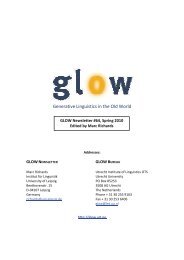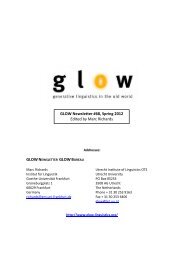Practical Information - Generative Linguistics in the Old World
Practical Information - Generative Linguistics in the Old World
Practical Information - Generative Linguistics in the Old World
Create successful ePaper yourself
Turn your PDF publications into a flip-book with our unique Google optimized e-Paper software.
Constra<strong>in</strong>ts on Concept FormationDany Jaspers (CRISSP-HUBrussels, KULeuven)1. IntroductionA limitation on natural concept formation and lexicalisation <strong>in</strong> natural language has hi<strong>the</strong>rtogone unobserved. To br<strong>in</strong>g it to light and show its relevance to biol<strong>in</strong>guistics, I will firstcharacterize <strong>the</strong> nature of this Concept Formation Constra<strong>in</strong>t (CFC) by illustrat<strong>in</strong>g itsoperation <strong>in</strong> <strong>the</strong> lexical doma<strong>in</strong> of logical operators. Secondly, I will extend <strong>the</strong> constra<strong>in</strong>t toa wide range of o<strong>the</strong>r lexical doma<strong>in</strong>s. Third, a proposal will be made about <strong>the</strong> orig<strong>in</strong> of thisconstra<strong>in</strong>t by prov<strong>in</strong>g <strong>the</strong> existence of a surpris<strong>in</strong>g homology between logical concepts on <strong>the</strong>one hand and <strong>the</strong> system of primary (RGB) and secondary (YMC) colour percepts on <strong>the</strong>o<strong>the</strong>r. This colour-logic homology suggests that basic conceptual oppositions are <strong>in</strong>natepatterns deeply rooted <strong>in</strong> <strong>the</strong> physiological structure of human cognition, somehow l<strong>in</strong>ked to<strong>the</strong> system of trichromatic vision that generates <strong>the</strong> colour oppositions.2. The Concept Formation Constra<strong>in</strong>t for logical operatorsIn <strong>the</strong> realm of propositional operator concepts, a set of four natural operators is generated bymak<strong>in</strong>g subtractions from a fixed doma<strong>in</strong> space of values via a series of two successive b<strong>in</strong>arydivisions. There is an <strong>in</strong>itial exhaustive division between <strong>the</strong> contradictories NOR and OR(1b); with<strong>in</strong> <strong>the</strong> rema<strong>in</strong><strong>in</strong>g non-NOR space of values, we can ei<strong>the</strong>r carve out <strong>the</strong> subset AND,leav<strong>in</strong>g <strong>in</strong>clusive OR as superset space (1c), or we can divide <strong>the</strong> <strong>in</strong>clusive OR spaceexclusively <strong>in</strong>to AND and exclusive OR (1d).Natural logical terms are lexicalisations of concepts that match and respect <strong>the</strong>se two naturalb<strong>in</strong>ary divisions of <strong>the</strong> concept space. This results <strong>in</strong> a set of four naturally lexicalizedconcepts that can be summarized by means of <strong>the</strong> follow<strong>in</strong>g XP-like structure <strong>in</strong> labeledbracket<strong>in</strong>g format:(2) [ D nor [ or-<strong>in</strong>clusive or-exclusive and]].Of <strong>the</strong>se four, three are contrary concepts (NOR, OR-excl, AND), while <strong>the</strong> fourth, OR-<strong>in</strong>cl,is a subspace of <strong>the</strong> orig<strong>in</strong>al doma<strong>in</strong> D and denotes <strong>the</strong> union of <strong>the</strong> two contraries and and orexclusive.One can of course freely decide to violate <strong>the</strong> CFC and create concepts which arenon-congruent with <strong>the</strong> natural b<strong>in</strong>ary divisions. That will however systematically result <strong>in</strong>notions which never arise naturally <strong>in</strong> normal natural language acquisition. Thus <strong>in</strong> <strong>the</strong> realmof propositional operators one can cut across <strong>the</strong> basic NOR-OR division (1b) to create <strong>the</strong>two well-known but nonnatural operators *nand and *iff.





